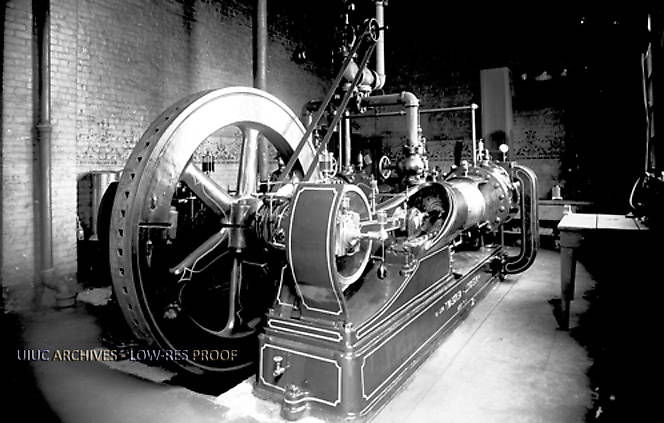UIUC CEE Railway Engineering Wheel Testing
By Steve McCollum; posted August 4, 2013
View Original: Click to zoom, then click to magnify (664 x 423) 106KB

|
When I was still an undergraduate student (pre-1969), studying at the University of Illinois Civil Engineering department, I had to walk past the Railway Engineering Wheel Lab almost every day. These guys had a test rig to do fatigue and thermal stress testing on railroad wheels. It consisted of a large, somewhat noise-reducing box containing a shaft with a wheel mounted on the end, and brake gear (cylinder, brake shoes, etc). They'd run the wheel up to speed, then do a full brake application, and when they had pulled the enormous flywheel on the other end of the shaft nearly to a stall, the steel tire would be red-hot, and the brake would release. Then they sprayed cold water on the wheel, spun up the flywheel; sort of like brake - rinse - repeat. After thousands of cycles they removed the wheel, sawed off the tire, polished a section, and looked for thermally-induced cracks. The "spin 'er back up" was done by a 600 HP Ball reciprocating steam engine, which ran off the University's central steam plant. It had its own immense flywheel, and a flat leather belt to a pulley on the common shaft with the second flywheel and the wheel. The brake would pull that steam engine almost to a stall before it released. I spent many an hour just watching that rig run! This setup was a holdover from an earlier era, when the University had a huge railroad lab, including a dynamometer on which you could park and test a 6,000 HP locomotive! After decades of faithful service, the day arrived when the old Ball engine needed someone to cast a new set of babbitt bearings for it. Rather than do this, they scrapped it out and substituted a Diesel truck engine, only to find out that the engine would wear out and roach itself after a few months of wide open throttle operation. Sometimes, way over-designed hunks of cast iron rule! Here's a picture of a similar engine, taken at the Peoria & Eastern Railway shops in Urbana, IL sometime around 1920. I'm still looking for a photo of the test rig itself. |